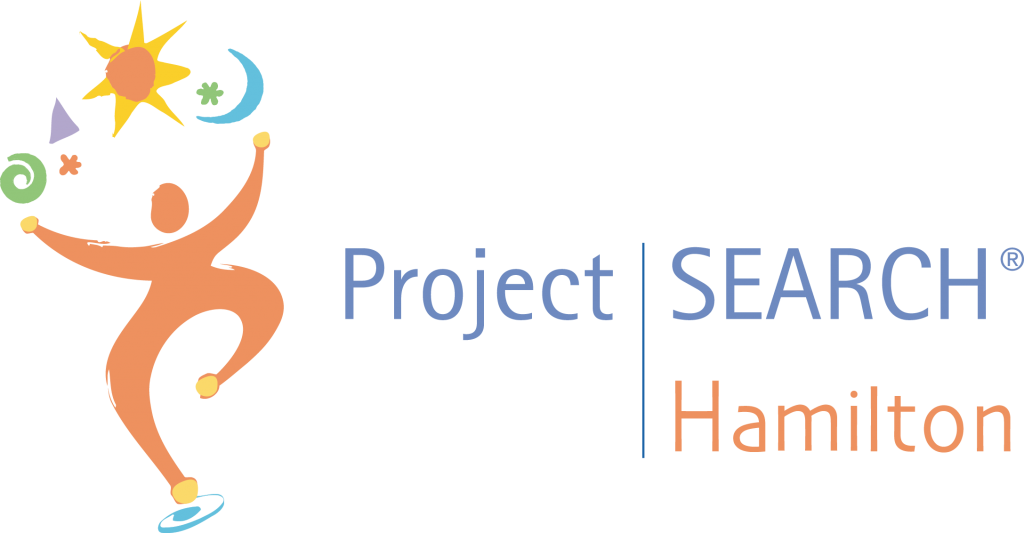
 What is Project SEARCH?
What is Project SEARCH?
In 1996, Project SEARCH was launched at the Cincinnati Children’s Hospital Medical Centre. Project SEARCH is a unique, business-led, one-year, transition-to-work program for young people with developmental or intellectual disabilities. The main objective is to prepare students for employment with job skills training through a combination of classroom instruction and hands-on career training. This program takes place entirely at the workplace.
The singular goal of Project SEARCH is competitive employment for every program graduate!
Important resources:
- HWDSB Project SEARCH Application 2025-2026 (fillable)
- Project SEARCH Virtual Information Night (2025-2026)
- Project SEARCH Hamilton Partners with HWDSB, YMCA and YWCA (June 27, 2022)
- Project Search Recruitment Timeline 2025-2026
Project SEARCH Contacts:
| Vesna Frankovich Project Search Teacher 20 Education Court, Hamilton, Ontario. L9A 0B9 [email protected], 365-833-1247 |
Theresa Heida Project Search Teacher 20 Education Court, Hamilton, Ontario. L9A 0B9 [email protected], 289-921-6780 |
Carly Robinson Project Search Special Assistant Teacher 20 Education Court, Hamilton, Ontario. L9A 0B9 [email protected], 905-296-2504 |
What is ‘competitive employment’?
- Employment in an integrated setting (coworkers with and without disabilities work alongside each other)
- Year-round employment (not seasonal)
- 20 hours of work each week
- Paid the prevailing wage
Currently, there are 700+ Project SEARCH sites worldwide. The program reports that 75% of students find gainful employment within a year of graduation.
The Project SEARCH program model was introduced in Ontario by the Ontario Disability Employment Network (ODEN). Other Ontario sites include two sites in Toronto, two in Halton, six new sites opened in fall 2022 and more opening in fall 2023.
Project SEARCH in Hamilton
HWDSB is at the forefront of bringing Project SEARCH to Canada as it implements this program in the community. Students are placed in internship positions at the host site, Hamilton-Wentworth District School Board, and are supported during their placements by a special education teacher and job and skills developers from the Board and March of Dimes. After graduation, March of Dimes provides personalized employment support so students secure quality jobs.
| Benefits to the Students: | Benefits to the Business: |
|
|
Who participates in a Project SEARCH class?
- Students (aged 18 to 20) with a disability who are in their final year of school attendance.
- Each site is staffed by a teacher and Skills Trainer.
- Ongoing collaboration with the business liaison and/or department mentor to identify internship sites, necessary skill development and support student success.
Student Selection:
Project SEARCH team members select interns using information from the application, skills assessments, selection rubric scores, and student interviews.
Program Overview
Project SEARCH follows the school year calendar (September to June). Students attend the program for the full school year in the host business. The business provides an on-site classroom space that can accommodate up to 12 students. The site is staffed by a special education teacher and job coaches.
- Program Orientation (3 to 4 weeks)
- Classroom sessions focused on new employee orientation, hands-on skill assessment and familiarization with the business environment.\
- Internship (9 to 12 weeks)
- Morning classroom session (1 hour a day)
- Interns engage in activities to enhance employability and independent living skills. Some of the classroom activities include: team building, getting around the workplace, workplace safety, technology, social skills, communication, interviewing skills, money management, and job search skills.
- Morning classroom session (1 hour a day)
-
- Internship (4-5 hours a day (including a 30-minute lunch))
- Interns engage in targeted internships where they learn specific, relevant, and transferable job skills. Students also build communication, teamwork and problem-solving skills.
- Interns work alongside current staff.
- Students are supported and guided by the teacher and job coaches. Ongoing feedback and collaboration with the department mentor takes place.
- Potential student worksites are identified through a continuous collaborative process involving the teacher, job coaches and business liaison.
- Afternoon classroom session (1 hour a day)
- Interns review their work and experiences and plan for the next day.
- Internship (4-5 hours a day (including a 30-minute lunch))
**Students rotate through two to three different worksite internships throughout the business over the course of the year**
Expectations of Project SEARCH Partners
| Host Business | School Board | Parents/Guardians |
|
|
|
Employment Planning Meetings
Review meetings are held six (6) times a year. The focus is on talking about the intern’s progress in gaining competitive skills and employment. The purpose of these meetings is to:
- Keep team members updated on the intern’s progress
- Identify ways to support the intern to help reach the goal of competitive employment
Everyone who is actively involved in helping the intern find employment attends the meetings. This includes:
- Intern
- Project SEARCH Instructor
- Skills trainer
- Family member
- Job developer
- Other support members
Job Placement and Community Connections
During the last few months of the program the emphasis is on refining skills, achieving the career goal, and carrying out individualized job development. Job development is based on the intern’s experiences, strengths, interests, and skills. Linkages to appropriate services in the community are critical at this stage, as interns prepare to graduate from the program, to ensure a successful transition to employment and adult life. Services are identified in the community that provide assistance with necessary adaptations required to perform a specific job. Job coaching and long-term follow along are arranged through March of Dimes.
Community Partnerships Include:
ODEN, March of Dimes, Path Employment, YMCA Employment Services, Canadian Down Syndrome Association, Developmental Services Ontario (DSO) Hamilton-Niagara Region, McMaster Children’s Hospital Autism Program, and Willowbridge Community Services.
Updated on Tuesday, January 14, 2025.

